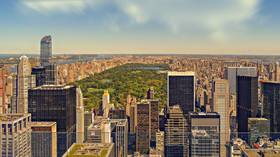New York calls for Monsanto’s 'toxic' pesticides to be banned from city parks

Two New York City council members have introduced legislation that would ban the spraying of glyphosate-based herbicides and other toxic pesticides in parks and other public spaces.
The measure would prohibit the application of synthetic pesticides within 75 feet of a natural body of water. It would encourage city agencies to start using biological pesticides, which are derived from naturally occurring substances rather than synthetic ones.
“Parks should be for playing not pesticides,” a co-sponsor of the measure, New York City council member Ben Kallos, told Environmental Health News. “All families should be able to enjoy our city parks without having to worry that they are being exposed to toxic pesticides that could give them and their families cancer.”
Also on rt.com Bayer beware! Monsanto found guilty of poisoning French farmerGlyphosate is the world’s most widely used herbicide. It is the active ingredient in agrochemical firm Monsanto’s Roundup, which is a very popular weed killer in the US.
The herbicide is commonly used in New York, sprayed hundreds of times a year in public green spaces to treat weeds and overgrowth. Kallos said he fears letting his young daughter play in New York's Central Park because of the dangers of pesticide exposure. He expressed hopes that public awareness generated by the trials will drive support for his bill. A similar measure introduced four years ago failed to gather enough support to pass.
“The science gets stronger and stronger every day, and public interest around the issue is getting stronger,” said Kallos.
Also on rt.com Bayer must pay another $80mn in Monsanto Roundup cancer trialThe number of lawsuits against Monsanto has been surging lately and, according to expert estimates, could cost its new owner Bayer billions of dollars in damages in the coming years. The surge in litigation followed a $289-million California court verdict in which Monsanto was ordered to pay damages to a man who alleged its glyphosate-based weed killers, including Roundup, caused his cancer.
More than 11,000 cancer victims are currently suing the firm alleging exposure to Roundup and other glyphosate products it sells caused them to develop non-Hodgkin's lymphoma, b-cell lymphoma, leukemia, or other forms of cancer after using the product.
Bayer, however, rejects all the accusations, asserting that glyphosate herbicides are not carcinogenic.
Also on rt.com ‘Completely safe’: Monsanto owner Bayer hit by new wave of lawsuits over Roundup weed killerThe US Environmental Protection Agency (EPA) maintains glyphosate is not likely to be carcinogenic. It had labeled glyphosate a carcinogen in 1985, but reversed the position in 1991. The World Health Organization’s cancer research agency classified glyphosate as “probably carcinogenic to humans” in 2015. California has listed glyphosate in its Proposition 65 registry of chemicals known to cause cancer.
For more stories on economy & finance visit RT's business section














